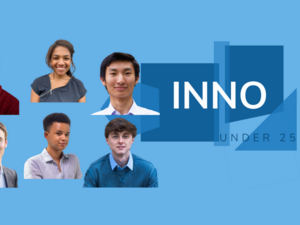
Industrial companies in the U.S. collectively use 18.2 billion gallons of water every day in order to run their operations. As a result, they also spend a whopping $106 billion every year to treat contaminants and waste that get in their water.
Now, two Ivy League siblings think they can dramatically reduce these costs with their company H2Ok Innovations, a contaminant management platform that helps industrial and manufacturing businesses optimize water usage and treatment through predictive diagnostics.
“You can think about it a little like a weather forecasting system but for contaminants and for inside the production systems,” David Lu, co-founder and CTO of the startup, told Rhode Island Inno. “It’s also for the contamination inside water-based industrial systems to help them get more visibility so they can take practiced actions.”
Lu first got interested in water quality while living in his dorm room at Brown University. At the time, some of the water coming from the sinks actually came out the color brown — the running joke was that Brown had brown water.
As a chemistry and computer science major, Lu took some samples of the water from his dorm and found it contained high concentrations of copper, a metal regulated by the U.S. Environmental Protection Agency. He realized there was opportunity to help municipalities root out and treat waste in their water.
David Lu turned to his sister, Annie Lu, a student at Harvard University who has experience working at startups and in venture capital. The two teamed up to co-found their business in 2018 and incubated at the Harvard i-lab, developing a suite of hardware and software solutions designed to treat contaminants in wastewater and run more efficient facilities. Annie Lu heads up the business side as CEO.
The duo first planned to use their technology on a municipal level, but after going through the Techstars Farm to Fork program in Minnesota late last year and seeing the long sales cycle in the municipal space, H2Ok Innovations pivoted to the industrials sector.
According to David Lu, most water sensors industrial companies use cost $30,000 per sensor or more. The cost is so astronomical that industrial companies only buy a few to place at various points of their water streams, he said.
In response, H2Ok Innovations has developed the “AquaSensor,” a low-cost sensor that monitors water chemistry and composition. AquaSensors are 100 times cheaper than traditional water sensors, according to Lu, allowing companies to purchase hundreds and place them all over their water flow, including upstream. When there is a spill or a problem, AquaSensors can tell exactly when that spill occurs and even what room or tank in the facility it is coming from.
The AquaSensor is the first of three solutions H2Ok Innovations has created so far. The next piece of hardware is the “PhoneScope,” a low-cost microscope with a computer vision app that allows users to screen for micro-contaminants in a water system.
The PhoneScope is designed to help plant workers better screen for filamentous bacteria, a class of bacteria that often grows in wastewater systems and can force facilities to shut down for days at a time, ultimately costing millions of dollars.
Currently, Lu said, most industrial companies just take samples and put them under a normal microscope or send them to consultants to get results, which may not come back for a week. PhoneScope allows workers to take pictures on an app, then uses an algorithm to tell them instantly what type of filamentous bacteria they are looking at, he said.
H2Ok’s third product is a software platform called “Neptune.” Neptune puts all of the data collected by PhoneScope into the cloud, then uses a machine learning algorithm to analyze the data. Lu said Neptune provides insights to plant managers so they can better manage the water and even do their jobs remotely.
“We see ourselves as a data company,” said Lu. “We built out hardware because there is no accessible hardware on the market to be able to collect all of this information.”
After graduating from the BlueSwell incubator late last year, H2Ok Innovations is now planning to deploy its technology to several companies, including some Fortune 500 firms. The startup has also formed a partnership with a textiles marketplace and distributor.
Looking ahead to the next 12 months, the startup’s focus will first be on getting its products installed with its first paying customers, then developing whitepapers and research on the cost savings generated with its hardware and technology.
Lu also said H2Ok Innovations will likely raise a seed round sometime in the first quarter of 2021 to expand the team and hire more engineers and sales people. Ultimately, though, the industrials sector could just be the beginning for the startup.
“Our vision is to create the world’s largest database on real-time water quality data,” he said. “With that, there is a lot of potential from there to start off in the industrial space as a foothold to scale a lot of our technologies to many other industries and scaling also to the environmental space.”
Annie Lu was one of BostInno's 25 Under 25 in 2020, while David Lu was part of the Rhode Island Inno Under 25 the same year.
Bram Berkowitz is a contributing writer for American Inno.








